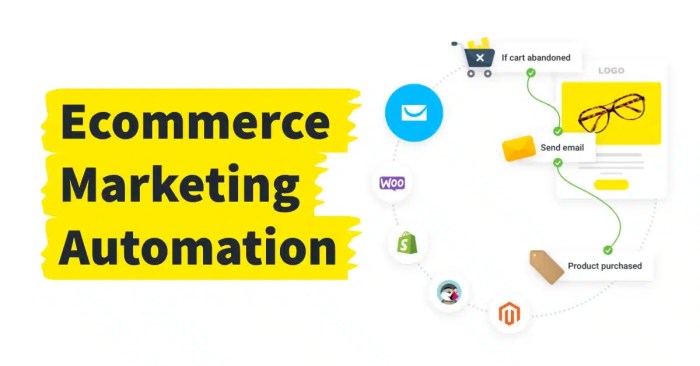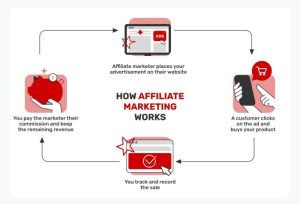
Embark on a journey through the world of email marketing automation for e-commerce, where businesses thrive through targeted and automated campaigns that drive sales and engagement.
Discover how personalized strategies and key tools revolutionize the way online stores connect with their customers.
Email Marketing Automation for E-commerce

Email marketing automation in the context of e-commerce involves using software and technology to send targeted and personalized emails to customers based on their behavior, preferences, and interactions with the online store. This automated approach helps businesses streamline their communication efforts, increase customer engagement, and drive sales.
Benefits of Email Marketing Automation for E-commerce
- Increased customer engagement through personalized content and recommendations.
- Improved conversion rates by sending relevant offers and promotions at the right time.
- Enhanced customer loyalty through targeted communication and follow-up emails.
- Time and cost savings by automating repetitive tasks like welcome emails, order confirmations, and abandoned cart reminders.
Importance of Personalization in Email Marketing Automation for E-commerce
Personalization is crucial in email marketing automation for e-commerce as it helps create a more tailored and relevant experience for customers. By segmenting the audience based on demographics, behavior, and purchase history, businesses can deliver personalized product recommendations, special offers, and content that resonates with each customer, ultimately leading to higher engagement and conversions.
Key Features and Tools for Effective Email Marketing Automation in E-commerce
- Segmentation capabilities to target specific customer groups with personalized content.
- Automated workflows for sending triggered emails based on customer actions.
- A/B testing functionality to optimize email performance and improve results over time.
- Integration with e-commerce platforms to track customer behavior and purchase history.
- Analytics and reporting tools to measure the effectiveness of email campaigns and make data-driven decisions.
Marketing E-commerce
In today’s digital age, marketing strategies for e-commerce businesses have evolved significantly compared to traditional methods. Leveraging digital channels and social media platforms has become crucial for driving growth and increasing sales in the competitive e-commerce landscape.
Comparison of Traditional vs. E-commerce Marketing
- Traditional marketing often relies on physical advertising methods such as print ads, billboards, and TV commercials, while e-commerce marketing focuses on online platforms like websites, social media, and email campaigns.
- E-commerce marketing allows for more targeted and personalized approaches, utilizing data analytics and customer behavior insights to tailor marketing strategies effectively.
- Traditional marketing can have a broader reach but may lack the specificity and customization that e-commerce marketing offers to engage with customers more meaningfully.
Leveraging Digital Marketing Channels for Growth
- E-commerce businesses can utilize digital marketing channels such as email marketing, social media advertising, and search engine optimization () to reach a larger audience and drive traffic to their platforms.
- By creating engaging content, optimizing for search engines, and utilizing paid advertising on platforms like Google and Facebook, e-commerce brands can increase brand visibility and attract more customers.
- Implementing a robust digital marketing strategy that includes a mix of different channels can help e-commerce businesses stay competitive and adapt to changing consumer behaviors.
Role of Social Media Marketing in E-commerce
- Social media platforms like Facebook, Instagram, and Twitter play a crucial role in promoting e-commerce products and services to a wide audience.
- Through targeted advertising, influencer partnerships, and engaging content, e-commerce brands can connect with their target market and drive sales through social media channels.
- Building a strong social media presence and engaging with customers directly can help e-commerce businesses build brand loyalty and establish a community around their products.
Significance of and SEM in E-commerce
- Search engine optimization () is essential for e-commerce platforms to improve their visibility on search engine results pages (SERPs) and drive organic traffic to their websites.
- Search engine marketing (SEM), including pay-per-click (PPC) advertising, allows e-commerce businesses to target specific s and drive immediate traffic through paid search ads.
- By optimizing product descriptions, meta tags, and website content for relevant s, e-commerce brands can improve their search rankings and attract more qualified leads to their online store.
Final Wrap-Up

In conclusion, email marketing automation proves to be a game-changer for e-commerce success, offering unparalleled efficiency and results in reaching and converting customers.
Questions and Answers
How can email marketing automation benefit e-commerce businesses?
Automated campaigns help businesses reach customers at the right time, increasing engagement and boosting sales.
What are the key features needed for effective email marketing automation in e-commerce?
Key features include segmentation, personalization, automated workflows, and analytics to track campaign performance.





